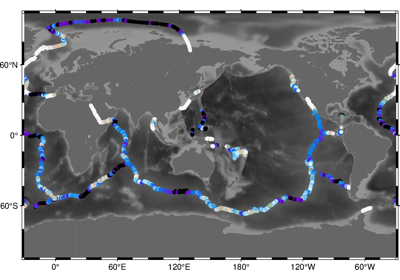pygmt.grdtrack¶
-
pygmt.grdtrack(points, grid, newcolname=None, outfile=None, verbose=None, coltypes=None, interpolation=None, **kwargs)[source]¶ Sample grids at specified (x,y) locations.
Grdtrack reads one or more grid files and a table with (x,y) [or (lon,lat)] positions in the first two columns (more columns may be present). It interpolates the grid(s) at the positions in the table and writes out the table with the interpolated values added as (one or more) new columns. A bicubic [Default], bilinear, B-spline or nearest-neighbor interpolation is used, requiring boundary conditions at the limits of the region (see
interpolation; Default uses “natural” conditions (second partial derivative normal to edge is zero) unless the grid is automatically recognized as periodic.)Full option list at https://docs.generic-mapping-tools.org/latest/grdtrack.html
Aliases:
V = verbose
f = coltypes
n = interpolation
- Parameters
points (str or numpy.ndarray or pandas.DataFrame or xarray.Dataset or geopandas.GeoDataFrame) – Pass in either a file name to an ASCII data table, a 2D
numpy.ndarray, apandas.DataFrame, anxarray.Datasetmade up of 1Dxarray.DataArraydata variables, or ageopandas.GeoDataFramecontaining the tabular data.grid (xarray.DataArray or str) – Gridded array from which to sample values from, or a filename (netcdf format).
newcolname (str) – Required if
pointsis apandas.DataFrame. The name for the new column in the trackpandas.DataFrametable where the sampled values will be placed.outfile (str) – The file name for the output ASCII file.
Select verbosity level [Default is w], which modulates the messages written to stderr. Choose among 7 levels of verbosity:
q - Quiet, not even fatal error messages are produced
e - Error messages only
w - Warnings [Default]
t - Timings (report runtimes for time-intensive algorithms);
i - Informational messages (same as
verbose=True)c - Compatibility warnings
d - Debugging messages
coltypes (str) – [i|o]colinfo. Specify data types of input and/or output columns (time or geographical data). Full documentation is at https://docs.generic-mapping-tools.org/latest/gmt.html#f-full.
interpolation (str) –
[b|c|l|n][+a][+bBC][+c][+tthreshold]. Select interpolation mode for grids. You can select the type of spline used:
b for B-spline
c for bicubic [Default]
l for bilinear
n for nearest-neighbor
- Returns
track (pandas.DataFrame or None) – Return type depends on whether the
outfileparameter is set:pandas.DataFrametable with (x, y, …, newcolname) ifoutfileis not setNone if
outfileis set (track output will be stored in file set byoutfile)
